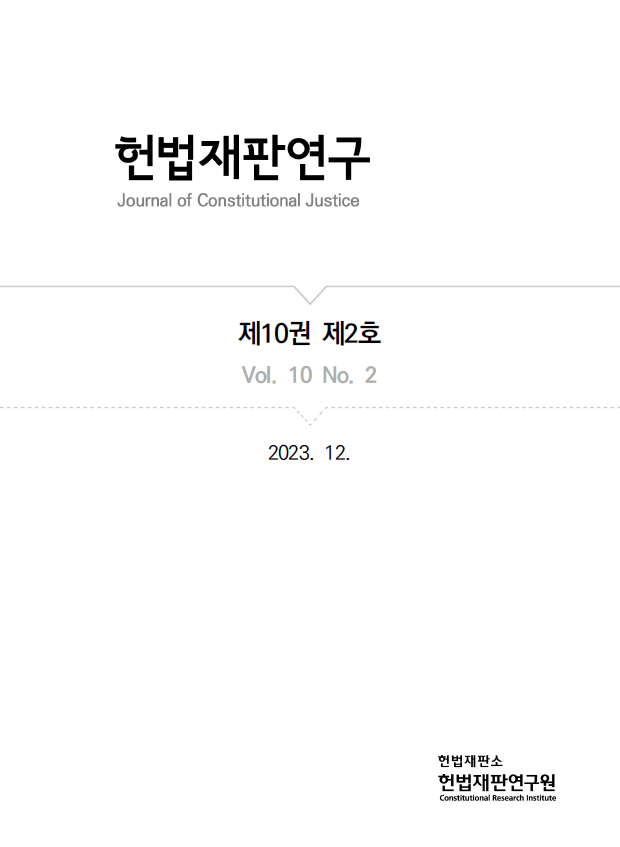학술논문
[특집1] 플랫폼 경제와 사회보장의 과제
이용수 0
- 영문명
- Platform economy and challenges of social security law
- 발행기관
- 헌법재판연구원
- 저자명
- 도재형(Do, Jae-Hyung)
- 간행물 정보
- 『헌법재판연구』제10권 제2호, 85~112쪽, 전체 28쪽
- 주제분류
- 법학 > 법학
- 파일형태
- 발행일자
- 2023.12.26
무료
구매일시로부터 72시간 이내에 다운로드 가능합니다.
이 학술논문 정보는 (주)교보문고와 각 발행기관 사이에 저작물 이용 계약이 체결된 것으로, 교보문고를 통해 제공되고 있습니다.

국문 초록
‘플랫폼 경제’란 디지털 또는 온라인 플랫폼을 기반으로 이루어지는 재화와 서비스의 생산・분배, 소비및 노동 등 경제 활동을 말하고, ‘플랫폼 노동’이란 이러한 온라인 플랫폼을 기반으로 이루어지는 노무제공(거래) 관계를 의미한다. 플랫폼 노동은 새로운 노무 제공 유형으로서 전통적인 사회보험법적 권한과책임의 분배 틀에 혼란을 주고, 다양한 사회보장법적 과제를 제기하고 있다.전통적인 사회보장 제도는 정규・표준 고용관계를 바탕으로 한 사회보험에 기반해 구성되어 있다. 사회정책은 완전고용을 가정하고, 노동시장에서 고용관계에 있는 노동자들을 정책의 주요 대상으로 하며,고용관계는 일반적으로 정규적이고 표준적인 고용관계이다. 그러나 플랫폼 경제의 일자리는 일시적이고불안정한 성격을 지닌다. 그 결과 많은 플랫폼 노동자들이 사회보험 보호 범위에서 벗어나 있다. 이 글에서는 이러한 플랫폼 경제가 우리 사회보장법 체계에 제기하는 과제들을 살펴본다.먼저, 위와 같은 한계에도 불구하고, 현행 사회보험 법제는 플랫폼 경제에서도 제대로 이행되어야 한다는 점을 분명히 할 필요가 있다. 플랫폼 종사자가 인격적 종속성 지표를 충족할 경우 사회보험법의 적용 대상이 되어야 한다. 필요하다면 플랫폼 종사자의 근로자성 판단 작업에 도움을 줄 수 있는 새로운법안도 고려해야 한다.나아가 사회보험 가입자의 범위를 확대해 플랫폼 종사자도 사회보험의 보호 범위에 포함시켜야 한다.최근 정부는 산재보험, 고용보험 분야에서 플랫폼 종사자를 비롯한 다양한 유형의 노동자를 보호 대상에포함하는 정책을 추진하고 있다. 대표적인 예가 2020년 12월 발표된 ‘전 국민 고용보험 로드맵’이다.전통적인 사회보험제도는 물리적 외형을 갖춘 ‘기업’을 상정하고 이에 맞춰 사회보험제도를 구성한다.그러나 플랫폼 경제는 업무 공간을 디지털화하고 장소에 구애받지 않는 기업 조직을 가능하게 한다. 플랫폼 경제에서는 전통적인 사회보험법적 책임 주체를 찾기 어려우며, 그에 따라 전통적인 사회보험료 부과 및 징수 체계는 새로운 도전에 직면하고 있다. 이와 관련하여 산재보험과 고용보험은 플랫폼 기업에사회보험법적 책임을 부과하는 새로운 제도를 마련했다. 또한 플랫폼 기업의 사회보험 법적 책임을 보다포괄적으로 규제하기 위한 새로운 법률도 준비 중이다.플랫폼 노동으로 상징되는 고용 형태의 다변화에 대응하기 위해 소득 기반 사회보험 방안이 논의되고있다. 이러한 소득 기반 사회보험 체계를 구축하기 위해서는 실시간 소득 파악 제도(RTI)가 시행되어야하고, 국세청 중심의 징수 체제가 마련되어야 한다.한편, 사회서비스 영역에선 직업능력 개발 프로그램의 참여 대상자를 확대하는 법률이 마련되었다.즉, 국민 평생 직업능력 개발법의 개정을 통해 플랫폼 종사자를 비롯한 모든 국민이 직업능력 개발 프로그램에 참여할 수 있는 법적 근거가 마련되었다.
영문 초록
The traditional social security system is structured based on social insurancesystems, those are based on regular and standard employment relationships. Socialpolicy assumes full employment, and the main target of policy is workers in anemployment relationship in the labor market, and the employment relationship isgenerally a regular and standard employment relationship. However, jobs in theplatform economy are temporary and unstable. As a result, many platform workersare outside the scope of social insurance protection.Despite the above limitations, the current social security law must be properlyimplemented in the platform economy. If necessary, new legislation may beconsidered that could help determine the status of platform workers as employees.The scope of social insurance subscribers should be expanded so that platformworkers are also included in the scope of social insurance protection. Recently, thegovernment has promoted policies that include various types of workers, includingplatform workers, as eligible for protection in the fields of industrial accidentinsurance and employment insurance. A good example is the ‘National EmploymentInsurance Roadmap’ announced in December 2020.The traditional social insurance system assumes a ‘company’ with an externalappearance. However, the platform economy digitizes the workplace and makesbusiness organization possible regardless of location. In the platform economy, itis difficult to find traditional social insurance legal entities, and as a result, thetraditional social insurance premium imposition and collection systems are alsofacing new challenges. In response to this, industrial accident insurance andemployment insurance have established new systems that imposes social insurancelegal liability on platform companies. Additionally, new legislation is being preparedto more comprehensively regulate the social insurance liability of platformcompanies.In order to respond to the diversification of employment forms symbolized byplatform labor, income-based social insurance plans are being discussed. In orderto establi sh s uch an i ncome-based social insurance system, a real-time incomeinformation system(RTI) must be implemented and a collection system centered onthe National Tax Service must be established.In the social service sector, the scope of participation in vocational competencydevelopment programs was expanded. Recent legislation has established a legal basisfor all citizens, including platform workers, to participate in vocational skillsdevelopment programs.
목차
키워드
해당간행물 수록 논문
- [특집1] 플랫폼경제의 발전에 따른 노동3권 보장의 쟁점과 과제
- [특집2] 보호출산제도 도입을 위한 헌법적 연구
- 대한민국 헌법에서 인권의 기능
- 권한쟁의심판의 당사자로서 국가행정기관 - 독립행정기관의 당사자능력을 중심으로 -
- 학문의 자유와 대학의 자율권의 주체에 관한 소고
- [특집1] 플랫폼 경제에 관한 헌법적 접근 – 플랫폼 노동의 보호와 플랫폼 사업의 규율 -
- [특집2] 멋진 신세계(Brave New World) 속 디지털 젠더 폭력
- [특집2] 아시아를 위한, 두 단계로 구성되는 인권보장체계의 제안
- [특집1] 플랫폼 경제와 사회보장의 과제
- 형사법 관련 헌법재판소 위헌결정의 최근 동향과 시사점
- 표현의 자유와 인격권 사이의 이익형량에 관한 비교법적 고찰
- 헌법재판소법 제47조 제3항 단서 중의 종전 합헌 결정 전의 형사판결에 대해 재심을 통해 면소 판결을 할 수 있는가?
참고문헌
관련논문
법학 > 법학분야 BEST
- 인공지능 판사, 과연 가능한가?
- 정치의 사법화와 사법의 정치화 : 온건하고 실용적인 헌법재판의 당위성
- 자국 우선주의 정책과 국제법상 난민⋅이민자 보호-트럼프 행정부의 미국 우선주의를 중심으로-
최근 이용한 논문
교보eBook 첫 방문을 환영 합니다!

신규가입 혜택 지급이 완료 되었습니다.
바로 사용 가능한 교보e캐시 1,000원 (유효기간 7일)
지금 바로 교보eBook의 다양한 콘텐츠를 이용해 보세요!



